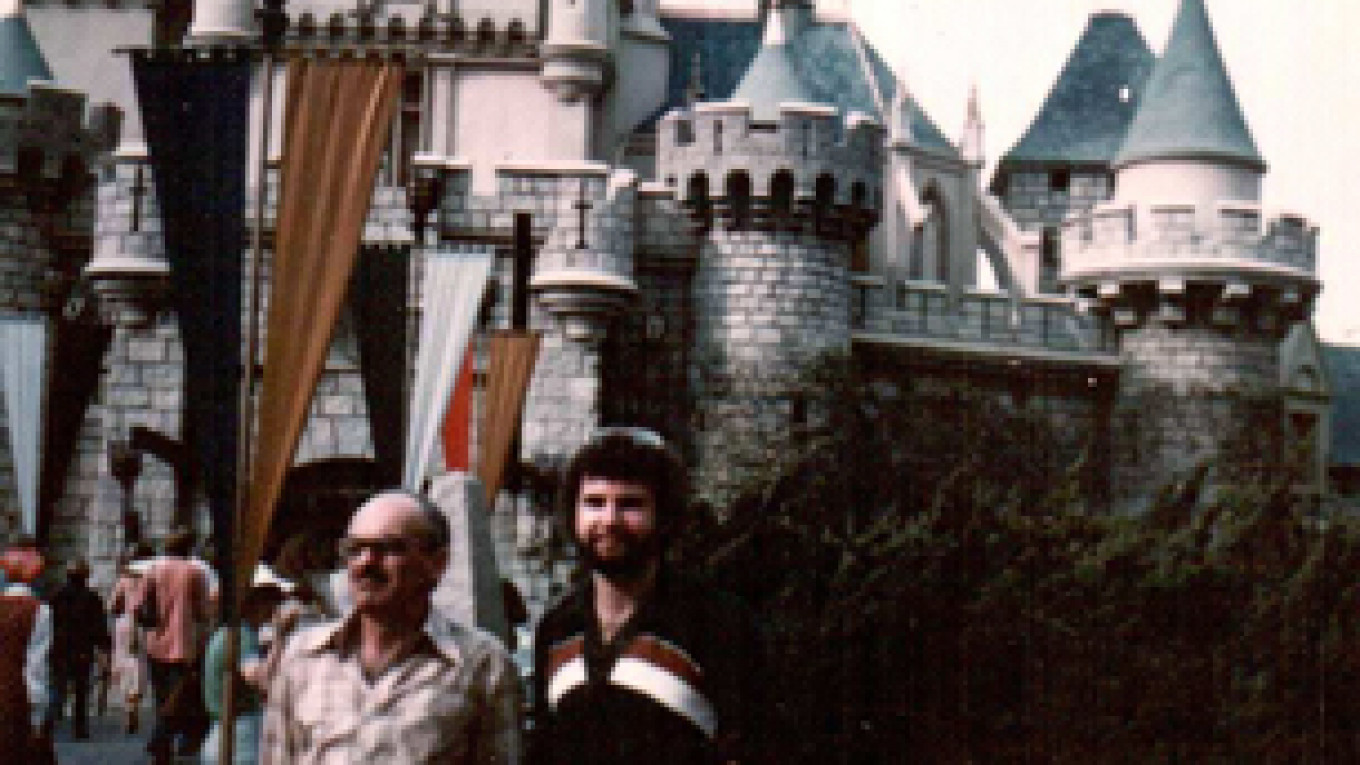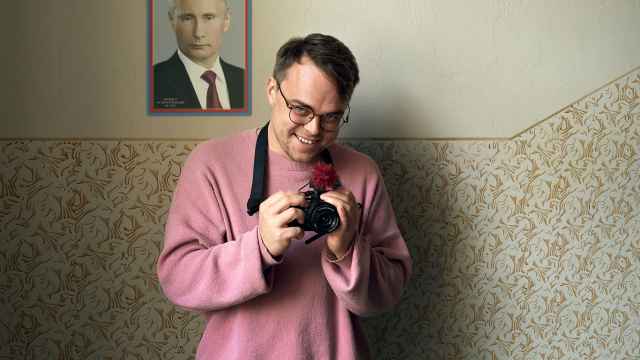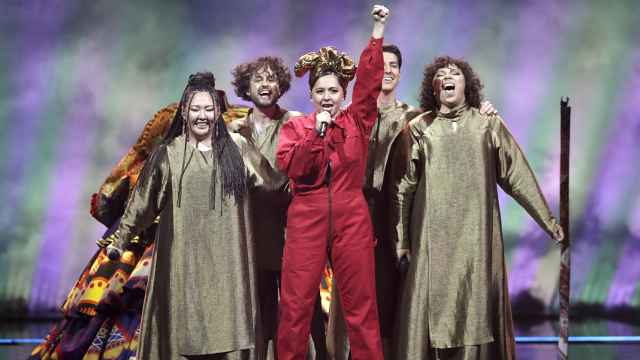Okudzhava became the object of universal love and affection among the public in the Soviet Union after his songs became popular in the early 1960s. He was part of the pop-star group of poets Yevgeny Yevtushenko, Andrei Voznesensky and Robert Rozhdestvensky, and he was one of the singing bards that included Vladimir Vysotsky, Novella Matveyeva, Alexander Galish and Yuly Kim.
But for all these similarities and connections, Okudzhava was a man apart. There was a gentleness, humanity and humility to his work that endeared him to people, but also present, although less obvious, was his dry and sober understanding of the world. How else can you explain his admission in "Long Live Great Monday!" that "There is no deliverance from my sweaty contemporaries"?
It was not a particularly affable Okudzhava that I met in the spring of 1979 when I was a wet-behind-the-ears senior in the Russian Department of the University of California at Irvine. The man I was assigned to translate for on trips around the university, the city and, yes, Disneyland, was never less than gracious, but rarely more than inscrutable. He almost never laughed, although on occasion he might give a wry, tired smile. He was not talkative, usually preferring to listen &mdash or pretend to listen &mdash as others talked and he lit up and sucked on another cigarette.
Helen Weil, the department chair at Irvine and the woman who invited Okudzhava to spend a month in Southern California teaching a seminar in contemporary Soviet literature and giving occasional concerts, was horrified by his smoking. He had only recently had a heart attack. In fact, his trip had been delayed at least once by his health problems.
 |
|
John Freedman / MT
Fragment of a poster for Bulat Okudzhava's 1979 concerts in Southern California.
|
 |
|
John Freedman / MT
Helen Weil and Bulat Okudzhava outside of the Pirates of the Caribbean attraction at Disneyland in 1979.
|
Perhaps he let his guard down then because of what had happened shortly before.
Okudzhava, Helen and I had been standing in line for the Space Mountain attraction for a good 20 minutes. Not making any connections to Okudzhava's recent medical history, I noticed a sign warning people with heart ailments to avoid this glorified roller coaster. Considering it humorous for some reason now unfathomable to me, I decided to translate the sign's message. Okudzhava's face went ashen. Helen, who had been absorbed in conversation with our guest, said, "Oh my God! Let's get out of here now!" Making light of it after we pushed our way back out of the long, winding line, Helen turned to me and said, "You may have just saved Soviet literature from an untimely loss!" That didn't get much of a response from Okudzhava, even as the fluffy Mickey Mouses did when we stepped into the souvenir stand to go shopping.
That was not the only service I provided to the famous singer and songwriter. For some reason, when the day of his first public concert approached, it was discovered that he did not have a proper guitar. When I heard about the problem, I asked if a Gibson steel-string would do, and he said it would. I quickly drove home and grabbed my guitar. For 90 minutes that afternoon, Okudzhava held an overflowing house of several hundred people in thrall with my guitar in hand. With a beauty and simplicity that I never dreamed of extracting from it, my instrument accompanied Okudzhava as he sang close to two dozen of the most famous and beloved songs in the Russian canon.
"I'd like to thank John for the use of his guitar," Okudzhava said matter-of-factly as the concert neared its end.
I appreciated the distance Okudzhava kept, not only from me but from almost everyone. There was dignity in that; there was the sense of a higher purpose; and there was the sense of a vulnerable human being taking care not to let the world intrude where it did not belong. He was selective of who he allowed to breach his private space.
Also sitting in on Okudzhava's month-long seminar were several individuals famous in the Russian émigré community, among them Sasha Sokolov, whose first novel "School for Fools" had recently been published to worldwide acclaim. Sokolov would sit in the back of the room and toss off comments that Okudzhava would parry. The author was someone Okudzhava was willing to open up to, and that made perfect sense to me.
I crossed paths with Okudzhava a couple of times after I ended up living in Moscow in 1988. In the early '90s I sat next to him backstage at a theater after a show. I didn't bother to remind him of Disneyland or guitars and he clearly did not remember me. Once again he was very much a man closed up in his own world. A few years after that, I attended a concert he gave at the Contemporary Play School. This was a place, on stage, where he was in his element. He eagerly fed off the audience that responded to his every word with the same adulation I had once seen an audience lavish on him in the United States.
On that day in Moscow, despite his increasingly frail appearance, it seemed to me that Okudzhava had been a part of my life forever and would remain so. In a sense I was right.
On Saturday the Contemporary Play School hosts its annual concert honoring the memory of Bulat Okudzhava. This kicks off two weeks of events marking the 85th anniversary of the writer's birth.
A Message from The Moscow Times:
Dear readers,
We are facing unprecedented challenges. Russia's Prosecutor General's Office has designated The Moscow Times as an "undesirable" organization, criminalizing our work and putting our staff at risk of prosecution. This follows our earlier unjust labeling as a "foreign agent."
These actions are direct attempts to silence independent journalism in Russia. The authorities claim our work "discredits the decisions of the Russian leadership." We see things differently: we strive to provide accurate, unbiased reporting on Russia.
We, the journalists of The Moscow Times, refuse to be silenced. But to continue our work, we need your help.
Your support, no matter how small, makes a world of difference. If you can, please support us monthly starting from just $2. It's quick to set up, and every contribution makes a significant impact.
By supporting The Moscow Times, you're defending open, independent journalism in the face of repression. Thank you for standing with us.
Remind me later.







